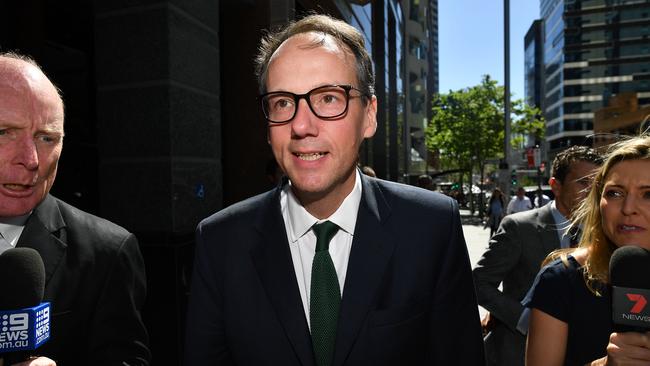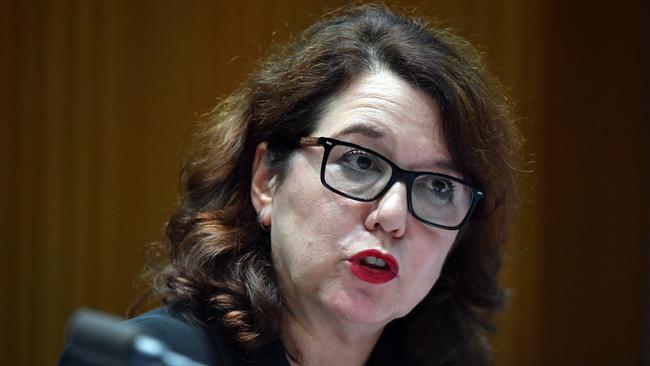ASIC reveals tougher approach after banking royal commission bruising
Corporate cop ASIC has responded to its bank inquiry bruising, saying it now has almost 40 investigations underway.

The corporate watchdog has revealed it has almost 40 investigations and reviews into alleged corporate civil and criminal breaches underway in the wake of the banking royal commission, as it looks to prove it can tackle rampant wrongdoing after a bruising at the hands of commissioner Kenneth Hayne.
The Australian Securities & Investments Commission has pointed to a 50 per cent increase in probes into Australia’s largest financial institutions over the last year as part of a formal response to the royal commission recommendations, which the regulator has used to highlight its work in becoming a tougher cop on the beat.
The release of its response comes ahead of a Senate estimates appearance for ASIC executives, and as the regulator goes cap in hand to the government to ask for better and more stable funding after years of piecemeal resourcing that has hampered its ability to keep corporate Australia on a tighter leash.
“This update is a crucial document for ASIC as it highlights our important work to date of putting ASIC on a more effective strategic footing, including creating a functionally separate Office of Enforcement,” ASIC chair James Shipton said.
“ASIC looks forward to working with the parliament, the government, APRA and other regulators on these reforms that are so crucial to the creation of a fair, strong and efficient financial system for all Australians,” Mr Shipton said.
ASIC said it had already “prioritised” work on 11 specific referrals of misconduct by eight companies or individuals referred to it by Kenneth Hayne’s royal commission, and has launched a further 12 investigation into case studies before the banking inquiry. This comes on top of the two Federal Court cases it has already launched against National Australia Bank over its $100 million fee-for-no-service scandal, and against rogue financial advisory Dover Financial and its former boss Terry McMaster.
Separately to this, a further 16 case studies are being assessed to see whether they could be the subject of court action.
“ASIC expects these investigations to result in a number of referrals to the Commonwealth Director of Public Prosecutions (CDPP) for assessment for criminal prosecution,” ASIC said.
CDPP director Sarah McNaughton SC today told Senate estimates it was already in “pre-brief” discussions with ASIC relating to one case which is expected to be filed with the prosecutor shortly.
ASIC has taken beleaguered wealth manager to Federal Court to obtain documents the company is claiming legal privilege over, relating to the fee-for-no-service scandal and subsequent alleged misleading of the regulator over the issue.
Ms McNaughton said it was expected the number of criminal briefs would rise from 32 last year to 42 this year, and up to 47 in the 2019-20 financial year. “Briefs could include more than one defendant,” Ms McNaughton said.

ASIC said it had already adopted Mr Hayne’s urging that it adopt a “why not litigate” enforcement stance, after the regulator was shamed over striking cosy outcomes and light-tough enforceable undertakings when companies broke the law.
The regulator has moved to establish an internal Office of Enforcement, which it says will be completed this year and “centralise” enforcement decisions. While it would take some time for the changes to become evident, ASIC said over the last 12 months there had already been a rise of 15 per cent in enforcement investigations on foot and a 50 per cent increase in the number of investigations of misconduct specifically by large financial institutions, their employees or subsidiaries.
Since October last year, ASIC has embedded employees in major institutions who have already conducted more than 100 onsite interviews of staff “at all levels”, the findings of which have been presented to company chief executives, business leaders and the boards of the institutions.
While ASIC’s embedded officers program has copped criticism over the potential for regulatory staff to become “captured”, the “frank disclosure” of findings to senior management of companies will leave the groups open to enforcement action if they fail to take action to stop or report misconduct.
ASIC will appear before Senate estimates tomorrow night, and has pledged to work with the government to ensure regulatory bodies are appropriately resourced.
Mr Shipton has complained that regulators in Hong Kong, where he used to work, were three times better funded for a financial sector half as large.
ASIC said there were 11 royal commission recommendations that expand its remit even further.
The regulator also said it would “immediately” work with the Australian Banking Association to overhaul the sector’s code of conduct and make it enforceable, and review conflicted remuneration in the life insurance industry.
It said it would also publish an accountability statement for the Banking Executive Accountability Regime before the end of the year.




To join the conversation, please log in. Don't have an account? Register
Join the conversation, you are commenting as Logout